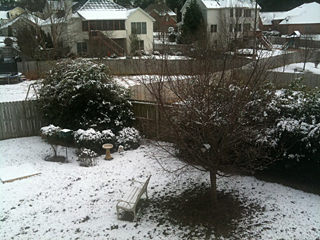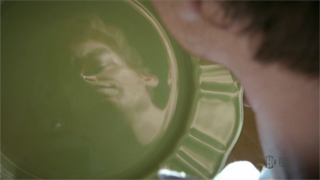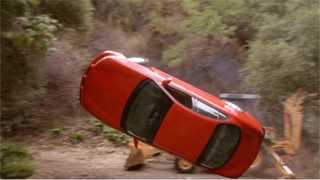December 2010
White Christmas
12/26/10 07:21 PM Filed in: Life

The last snow was in February, if I remember correctly.
0 Comments
Dexter: Season Five
12/22/10 06:06 PM Filed in: Life | Philosophy
I’m not sure what to make of season five of Dexter. I watched all of the episodes of the first four seasons in short order, thanks to digital versions being available on iTunes. This season I watched the episodes a week apart. Perhaps that gave me more time to reflect on each episode and consider weaknesses such as plot holes. My impression is that I had to suspend belief more this season than last and that there were more loose ends that, had they been pursued, would have lead to Dexter being caught.
And yet, I found the season finale to be quietly brilliant although perhaps not in the manner the show intended. One overarching theme was the ability of people to be transformed, something Dexter longs for. Jordan Chase transformed himself from an overweight lonely child to a fit leader with millions of followers (albeit followers seeking answers from a false prophet).
Deb changes from being a “by the book” cop with a clear sense of black and white to someone who sees more gray than before. In this scene, Dexter is starting to test Quinn’s blood stained shoes. Dexter thinks his sister is talking about Quinn, who is under suspicion for murdering a cop, but she’s really talking about herself:
 [Deb] “You think you know someone. Then it turns out you don’t. You think someone’s a good cop and then they... do something. I don’t know. All I’m saying is nothing is as simple as it seems.”
[Deb] “You think you know someone. Then it turns out you don’t. You think someone’s a good cop and then they... do something. I don’t know. All I’m saying is nothing is as simple as it seems.”
[Dexter] “You’re right about that.”
After Chase has been killed, Lumen finds that her “dark passenger” is gone. She no longer shares a passion in common with Dexter and she tells him she has to leave.
 Upon hearing this news, Dexter stares at his reflection in a plate, then throws the plate at the oven, shattering it into pieces all over the kitchen floor. It reminded me of the song “Smash the Mirror” in the rock opera “Tommy” by The Who. Smashing the mirror set Tommy free from his self-imposed prison. But Dexter remains trapped.
Upon hearing this news, Dexter stares at his reflection in a plate, then throws the plate at the oven, shattering it into pieces all over the kitchen floor. It reminded me of the song “Smash the Mirror” in the rock opera “Tommy” by The Who. Smashing the mirror set Tommy free from his self-imposed prison. But Dexter remains trapped.
The show ends with everyone, except Lumen, at Harrison’s first birthday party. Deb and Quinn have seemingly, if not overcome, at least agreed to work out their issues and appear to be a couple. Likewise, Laguerta and Batista are ready to begin their relationship anew. With signs of renewal all around him, Dexter reflects as he blows out Harrison’s birthday candle:
 Lumen said I gave her her life back. A reversal of my usual role. Well, the fact is, she gave me mine back, too. And I’m left not with what she took from me but with what she brought. Eyes that saw me, finally, for who I really am. And this certainty that nothing, nothing, is set in stone. Not even darkness. While she was here, she made me think for the briefest moment that I might even have a chance to be human. ... But wishes, of course, are for children.”
Lumen said I gave her her life back. A reversal of my usual role. Well, the fact is, she gave me mine back, too. And I’m left not with what she took from me but with what she brought. Eyes that saw me, finally, for who I really am. And this certainty that nothing, nothing, is set in stone. Not even darkness. While she was here, she made me think for the briefest moment that I might even have a chance to be human. ... But wishes, of course, are for children.”
Dexter sees transformation all around him and says that “nothing, nothing is set in stone.” And yet his despair remains. Paradoxically, even as he acknowledges the possibility of change, and sees it all around him, he extinguishes that hope for himself. He is caged by a philosophy that isn’t supported by the evidence he knows to be true.
 On a lighter, less philosophical note, someone on the Internet commented that if Dexter doesn’t learn to drive, he’s going to kill somebody.
On a lighter, less philosophical note, someone on the Internet commented that if Dexter doesn’t learn to drive, he’s going to kill somebody.
And yet, I found the season finale to be quietly brilliant although perhaps not in the manner the show intended. One overarching theme was the ability of people to be transformed, something Dexter longs for. Jordan Chase transformed himself from an overweight lonely child to a fit leader with millions of followers (albeit followers seeking answers from a false prophet).
Deb changes from being a “by the book” cop with a clear sense of black and white to someone who sees more gray than before. In this scene, Dexter is starting to test Quinn’s blood stained shoes. Dexter thinks his sister is talking about Quinn, who is under suspicion for murdering a cop, but she’s really talking about herself:

[Dexter] “You’re right about that.”
After Chase has been killed, Lumen finds that her “dark passenger” is gone. She no longer shares a passion in common with Dexter and she tells him she has to leave.

The show ends with everyone, except Lumen, at Harrison’s first birthday party. Deb and Quinn have seemingly, if not overcome, at least agreed to work out their issues and appear to be a couple. Likewise, Laguerta and Batista are ready to begin their relationship anew. With signs of renewal all around him, Dexter reflects as he blows out Harrison’s birthday candle:

Dexter sees transformation all around him and says that “nothing, nothing is set in stone.” And yet his despair remains. Paradoxically, even as he acknowledges the possibility of change, and sees it all around him, he extinguishes that hope for himself. He is caged by a philosophy that isn’t supported by the evidence he knows to be true.

Ancient Victories
For much of my career I’ve written software to bare metal. Back in the early ‘90s I worked for a company that made add-in products for Apple’s Macintosh line of computers. When something didn’t work, the hardware engineers would blame the software and the software engineers would blame the hardware. Too, challenges were made as to the actual knowledge and abilities of an engineer. Of course, friendly wagers were placed on the outcome.
I found this dollar bill attesting to bets won from the hardware group. I hope the Feds don’t get too upset that I scanned this.

I found this dollar bill attesting to bets won from the hardware group. I hope the Feds don’t get too upset that I scanned this.

Notes from The Resurrection of Jesus: A New Historiographical Approach
Along with taking the Yale course on Game Theory on iTunes, I’m reading The Resurrection of Jesus: A New Historiographical Approach by Michael R. Licona. It’s over 700 pages. Licona asks the question, “If professional historians who work outside of the community of biblical scholars were to embark on an investigation of the historicity of the resurrection of Jesus, what would such an investigation look like?” [pg. 19]. I’ve made it to page 180 and the book hasn’t yet dealt with the historical evidence for the Resurrection. The book starts by exploring what it means to do historical research and the role of worldview on the evaluation of evidence. This last part is very important. We may think that “seeing is believing” and there is some truth to that. But it’s also true that “believing is seeing,” that is, that our worldview effects how we evaluate data. The resurrection is one of those events that challenges worldviews. If one is a priori a naturalist, the resurrection account simply could not be what the early disciples of Christ claimed it was. If one is a priori a theist, then the resurrection may, or may not, have happened. For example, Christians say it did; Muslims say it didn’t. If one is uncertain of one’s worldview, it may likely lead to an inability to say that the evidence leads to anything conclusive.
Several statements in the book have resonated with me, because they touch directly on topics of several recent internet “discussions” and because they cohere with positions I’ve taken. Several of these deserve further elaboration and may become topics of future posts. Until then, I’ll just present each along with a brief observation.
The first pertains to how worldview influences the evaluation of evidence:
When historians seek to describe the past, they place facts within the framework of a narrative. Numerous interpretations and theories can be quite imaginative. Moreover, many times specific narratives can neither be proved nor disapproved, and historians from every camp often fail to place a sort of disclaimer informing readers of the tentativeness of their narrative, which is stated as fact. [pg. 57]
The second deals with the question of just how literal an interpretation of a text ought to be (see, for example, Operation Chaos). Are ancient descriptions to be understood as if they were video recordings?
However, no one would charge a portrait as being errant because they portrayed something in the background that was not there during the sitting but was created in order to communicate character or personality. Literary devices such as invented speeches and encomium are common traits of ancient bioi. Thus, in some instances, those who complain of contradictions and inventions in the Gospels are guilty of judging them in terms of photographic accuracy, when this may not have been the intent of the author. Still, this earmark of ancient bioi makes hermeneutical considerations of the Gospels all the more challenging. [pg. 76]
The third ties in with the second when dealing with “young earth creationism,” which I should note that I don’t think does justice to the Biblical text. Are there any good reasons to suppose “Tuesdayism” is or is not true, other than philosophical ones or a very literal reading of Genesis?
Neither historians nor philosophers can prove that the world is older than 10 minutes at which time everything was created with the appearance of age and that we were created with memories of events that never took place and with food in our stomachs from meals we never ate. [pg. 82]
The fourth is based on the principle of non-contradiction:
Another theory of truth is coherence theory, which states that a proposition is true when all of its components cohere with other propositions believed to be true. This theory of truth may be especially attractive to those historians who excel in forming creative narrative. Their narrative is true because it coheres better with other widely held propositions. [pg. 91]
The fifth echoes Russell’s statement from “The Problems of Philosophy” that, “All knowledge, we find, must be built up upon our instinctive beliefs, and if these are rejected, nothing is left.” What Licona says about historians is true for everyone:
Historians are required to make numerous philosophical assumptions before entering every historical investigation. For example, they assume the external world is real. They assume our senses provide a fairly accurate perception of the external world. They assume logic facilitates our quest for truth rather than merely functioning as a pragmatic tool that aims at our survival and quality of life. They assume natural laws in effect today were in effect in antiquity and that they operated in a similar manner. More importantly, the majority of historians assume that history is at least partially knowable. [pg. 156]
These last two quotes touch on logic, science, and the nature of truth and deserve a post of their own.
Several statements in the book have resonated with me, because they touch directly on topics of several recent internet “discussions” and because they cohere with positions I’ve taken. Several of these deserve further elaboration and may become topics of future posts. Until then, I’ll just present each along with a brief observation.
The first pertains to how worldview influences the evaluation of evidence:
When historians seek to describe the past, they place facts within the framework of a narrative. Numerous interpretations and theories can be quite imaginative. Moreover, many times specific narratives can neither be proved nor disapproved, and historians from every camp often fail to place a sort of disclaimer informing readers of the tentativeness of their narrative, which is stated as fact. [pg. 57]
The second deals with the question of just how literal an interpretation of a text ought to be (see, for example, Operation Chaos). Are ancient descriptions to be understood as if they were video recordings?
However, no one would charge a portrait as being errant because they portrayed something in the background that was not there during the sitting but was created in order to communicate character or personality. Literary devices such as invented speeches and encomium are common traits of ancient bioi. Thus, in some instances, those who complain of contradictions and inventions in the Gospels are guilty of judging them in terms of photographic accuracy, when this may not have been the intent of the author. Still, this earmark of ancient bioi makes hermeneutical considerations of the Gospels all the more challenging. [pg. 76]
The third ties in with the second when dealing with “young earth creationism,” which I should note that I don’t think does justice to the Biblical text. Are there any good reasons to suppose “Tuesdayism” is or is not true, other than philosophical ones or a very literal reading of Genesis?
Neither historians nor philosophers can prove that the world is older than 10 minutes at which time everything was created with the appearance of age and that we were created with memories of events that never took place and with food in our stomachs from meals we never ate. [pg. 82]
The fourth is based on the principle of non-contradiction:
Another theory of truth is coherence theory, which states that a proposition is true when all of its components cohere with other propositions believed to be true. This theory of truth may be especially attractive to those historians who excel in forming creative narrative. Their narrative is true because it coheres better with other widely held propositions. [pg. 91]
The fifth echoes Russell’s statement from “The Problems of Philosophy” that, “All knowledge, we find, must be built up upon our instinctive beliefs, and if these are rejected, nothing is left.” What Licona says about historians is true for everyone:
Historians are required to make numerous philosophical assumptions before entering every historical investigation. For example, they assume the external world is real. They assume our senses provide a fairly accurate perception of the external world. They assume logic facilitates our quest for truth rather than merely functioning as a pragmatic tool that aims at our survival and quality of life. They assume natural laws in effect today were in effect in antiquity and that they operated in a similar manner. More importantly, the majority of historians assume that history is at least partially knowable. [pg. 156]
These last two quotes touch on logic, science, and the nature of truth and deserve a post of their own.

